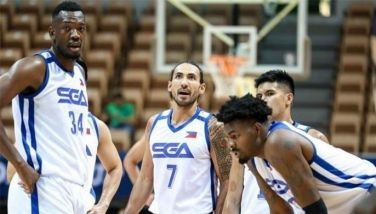Last of RP boxers falls

MILAN – The last man standing has fallen as featherweight Charly Suarez joined his four teammates by the wayside in extinguishing the Philippines’ final hope for a medal at the 15th AIBA World Boxing Championships here last Saturday.
But Suarez, the youngest of the five-man squad at 21, didn’t go down without a fight. He tried to slug his way to victory but South Korea’s Joo Min Jae, enjoying at least a five-inch height advantage, just wouldn’t be tagged.
“It’s not yet my time,” sighed Suarez. “I’ll learn from this experience. He kept catching me with uppercuts when I moved in, throwing me off-balance. I couldn’t get my timing. Next time we fight if we ever meet again, I’ll know better.”
National coach Pat Gaspi said he told Suarez to slip Joo’s left jab, duck in for a shot to the body and follow up with a combination to the head. But it was easier said than done. Suarez couldn’t execute because Joo didn’t only use the jab to fend off the Filipino – he scored twice with unhampered digs to the body in the first round.
Suarez gamely fought back but Joo kept a safe distance away. With Suarez unable to narrow the gap, the Korean was in total control of the long-range exchanges. Because he was longer, it was easier for the judges to spot Joo’s punches than Suarez.’
Gaspi said Suarez didn’t get tired and could’ve gone a few more rounds. The problem was he couldn’t adjust to take away Joo’s advantage in boxing from a distance.
Joo raced to a 4-0 lead before taking the first round, 5-1. Then he brought the count to 8-4 entering the third round before finishing off Suarez, 11-5.
“His punches were landing on my gloves but the judges were scoring points,” said Suarez in Pilipino. “I should’ve been more aggressive. I let him hit me from long range. I was bothered by his uppercuts.”
Gaspi said Suarez’ first round victim Julian Stan of Romania was a tougher opponent than Joo. Suarez had little difficulty outpointing Stan, 18-8, last Thursday.
“Suarez was getting hit and he couldn’t score,” said Gaspi. “That brought down his morale. Nanibago siya because I don’t think he has ever fought anyone as tall or as long. That’s the drawback when we lack foreign exposure. We aren’t exposed to different types of opponents so when we face fighters whom we’re not used to, we struggle.”
This year, ABAP and the Philippine Sports Commission sent Filipino fighters to a dual meet in Guam last January, the King’s Cup in Bangkok last April and a 2 1/2 week training camp in Cuba before moving here. The norm is for the national team to fight overseas once a quarter.
Polish referee Mariusz Gorny did a largely fair job of working the fight although Joo wrestled Suarez, desperately going for a knockout, down on the canvas twice in the final round without drawing a severe warning.
Suarez was downcast after the setback. He was the country’s last hope for a medal and blew it. At the World Championships in Chicago two years ago, the Philippines brought home a silver, courtesy of lightflyweight Harry Tanamor. In that tournament, four of seven Filipino fighters lost in the first round – they were Suarez, bantamweight Joan Tipon, lightwelterweight Delfin Boholst and welterweight Wilfredo Lopez. Two contenders, flyweight Violito Payla and lightweight Genebert Basadre, were eliminated in the quarterfinals.
Tanamor, appearing in his fifth World Championships, was tipped to bag a medal here but after drawing a first round bye, lost an 11-3 decision to Armenia’s Hovhannes Danielyan last Saturday. Both Tipon and Basadre, now a lightwelterweight, made it to the second round before exiting.
The only fighter to bow out in the first round of eliminations was lightweight Joegin Ladon.
In all, the Philippines’ report card showed three wins and five losses.
ABAP secretary-general Patrick Gregorio, who flew in to support the five fighters’ campaign and promote goodwill with AIBA, said it’s back to the drawing board for the Philippine team.
“This experience taught us a lot in our nine months with ABAP,” said Gregorio. “We now focus on the Southeast Asian Games, the Asian Games in 2010 and the Olympic qualifiers at the 2011 World Championships in Busan. Milan made us realize that we must reinvent our training program and if we do it as soon as possible, it’s not impossible for us to win in high-level international competitions.”
- Latest
- Trending





























